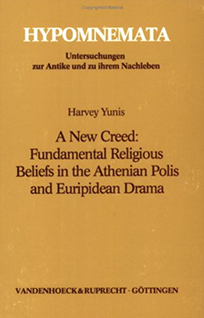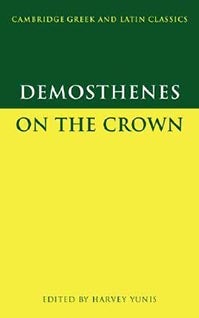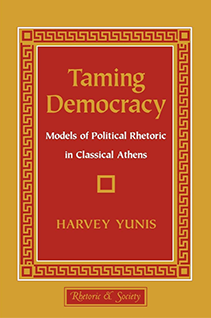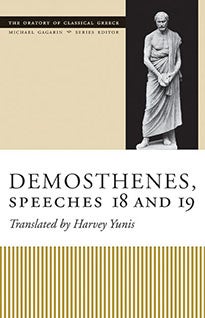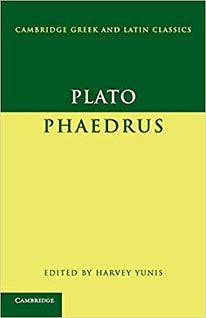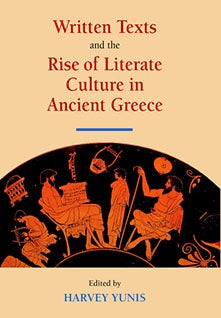Education
- PhD, Harvard University
Research and Teaching
- Greek Literature and Thought
- Plato
- Rhetoric
- Political Theory in the Ancient World
Fall 2024 Courses
- CLAS 107- Greek Civilization and Legacy
- LATI 201- Intermediate Latin I: Prose
Harvey Yunis is an eminent scholar of Greek rhetoric, tragedy, and political thought. His book Taming Democracy (1996) concerns theories of democratic political rhetoric that arose in fifth- and fourth-century BCE Athens, which was followed by a series of widely used annotated editions of original Greek texts by Demosthenes and Plato. Together with Robin Waterfield, he also published a new standard translation of Aristotle’s Rhetoric. His current research and teaching interests concern the nature of political discourse in Greco-Roman antiquity, the rise of artistic prose literature in ancient Greece, and the development of rhetoric from antiquity to the Middle Ages. He has recently completed work on the first edition of papyrus fragments of Demosthenes’s On the Crown (§§271-83) from the third century BCE, now the oldest extant manuscript of Demosthenes by two centuries. Additionally, he is working on political normativity in Aristotle and the aesthetics of Athenian political speech, and together with Henriette van der Blom, he is editing a volume covering Ancient Rhetoric to 350 CE as part of the Cambridge History of Rhetoric.
Yunis received fellowships from the National Endowment for the Humanities, the Center for Hellenic Studies, and the Alexander von Humboldt Foundation as well as grants from Andrew W. Mellon Foundation and the Gladys Krieble Delams Foundation. From 2003 to 2007, he was editor-in-chief of Rhetorica (2003-2007) and he is now on the editorial boards of both Rhetorica and Polis: The Journal for Ancient Greek and Roman Political Thought. He also serves on the managing committee of the American School of Classical Studies in Athens.
At Rice, Yunis is part of the the program in European Studies and he also teaches in Politics, Law & Social Thought. His course on democracy and the political ideas of ancient Greece highlights the continued relevance of carefully studying the classical texts of political thought as a foundation for contemporary democratic theory.
Selected Publications
1. Books and Edited Volumes
- Ed., Albert Henrichs, Greek Myth and Religion: Collected Papers II (Berlin: DeGruyter, 2019).
- Ed. and trans. with Robin Waterfield, Aristotle: The Art of Rhetoric (Oxford: Oxford University Press, 2018).
- Plato: Phaedrus (Cambridge: Cambridge University Press, 2011).
- Demosthenes, Speeches 18-19: On the Crown and On the Dishonest Embassy (Austin: University of Texas Press, 2005).
- Ed., Written Texts and the Rise of Literate Culture in Ancient Greece (Cambridge: Cambridge University Press, 2003). Paperback edition 2007.
- Demosthenes: On the Crown (Cambridge: Cambridge University Press, 2001).
- Taming Democracy: Models of Political Rhetoric in Classical Athens (Ithaca, NY: Cornell University Press, 1996).
- A New Creed: Fundamental Religious Beliefs in the Athenian Polis and Euripidean Drama (Göttingen: Vandenhoeck & Ruprecht, 1988).
2. Journal Articles and Book Chapters
- “Dionysius’ Demosthenes and Augustan Atticism” in Casper C. de Jonge and Richard Hunter (eds.), Dionysius of Halicarnassus and Augustan Rome: Rhetoric, Criticism and Historiography (Cambridge: Cambridge University Press, 2019) 83-105.
- “Paraphrase, Exegesis, Common Sense: Edward Meredith Cope’s Commentary on Aristotle’s Rhetoric” in Frédérique Woerther (ed.), Commenting on Aristotle’s Rhetoric: From Antiquity to the Present (Leiden: Brill, 2018), 231-45.
- “Plato’s Rhetoric in Theory and Practice” in Michael J. MacDonald (ed.), The Oxford Handbook of Rhetorical Studies (Oxford: Oxford University Press, 2017), 121-31.
- “Argument and Form, Philosophy and Rhetoric in the Phaedrus” in Michael Erler and Jan Erik Heßler (eds.), Argument und literarische Form in antiker Philosophie (Berlin: De Gruyter, 2013), 179-90.
- “Political Uses of Rhetoric in Democratic Athens,” in Johann P. Arnason, Kurt A. Raaflaub, and Peter Wagner (eds.), The Greek Polis and the Invention of Democracy: A Politico-cultural Transformation and Its Interpretations (London: Wiley-Blackwell, 2013), 144-62.
- “The Rhetoric of Law in Plato’s Apology of Socrates and Isocrates’ Antidosis” in Luc Brisson and Pierre Chiron(eds.), Rhetorica Philosophans: Mélanges offerts à Michel Patillon (Paris: Vrin, 2010), 67-73.
- “Rhetorical Argument and the Purpose of Dialectic in Plato’s Phaedrus,” Papers on Rhetoric 10 (2010), 259-67.
- “Transparency and Trust in Ancient Rhetoric and Poetics” in Laurent Pernot (ed.), New Chapters in the History of Rhetoric (Leiden: Brill, 2009), 109-17.
- “The Protreptic Rhetoric of the Republic” in G. R. F. Ferrari (ed.), The Cambridge Companion to Plato’s Republic(Cambridge: Cambridge University Press, 2007), 1-26.
- “The Rhetoric of Law in Fourth-Century Athens” in Michael Gagarin and David Cohen (eds.), The Cambridge Companion to Ancient Greek Law (Cambridge: Cambridge University Press, 2005), 191-208.
- “Politics as Literature: Demosthenes and the Burden of the Athenian Past,” Arion 8 (2000), 97-118.
